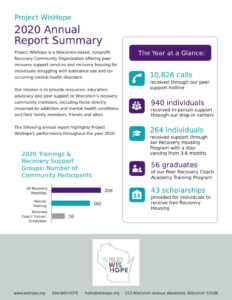Recovery Housing
Recovery Housing or Sober Living Homes in Milwaukee and Waukesha
Project WisHope supervises and maintains recovery residences or sober living housing properties for men and women throughout Wisconsin’s Milwaukee and Waukesha Counties. The overall purpose of our recovery housing program is to provide safe and affordable residential care for individuals suffering from substance use disorders who are in need of support to maintain a recovery lifestyle.
Our recovery residences are affordable and provide direct and daily access to peer recovery support services during and after addiction and other behavioral health treatment. Our vision is to provide our residents with the tools, education, treatment, and inspiration to maintain abstinence from drugs and alcohol for the rest of their lives. We achieve this by utilizing evidence-based practices, such as Motivational Interviewing, Dialectical Behavioral Therapy (DBT), Brain Spotting, and Cognitive Behavioral Therapy (CBT), and by promoting individual and community wellness.
Our approach is simple yet effective. We believe in a holistic community-based structure that re-engages and or teaches a client that everyday interaction with recovery and community is the path to a fulfilling life in recovery.

Our Recovery Residences Properties include:
The Farm:
The Farm is a luxurious, country farmhouse for men that sits on five acres of land and feels warm and welcoming – just like the home you’ve always wanted! Only men who have attained the Transition Phase of recovery reside here. Men still at the Acclamation Phase (in other housing) can aspire to be transferred here after they abstain and show good progress in their individual recovery programs.
The Louis House:
Women in recovery LOVE this house dedicated just for women with extra bathrooms and a chef’s kitchen. All Phases of recovery are in this house and the residents really thrive in this recovery-family atmosphere. This house is within walking distance to lots of employment opportunities and 12-Step meetings which is great for the women at the Transition and Independent Phase.
The Recovery Village:
The Recovery Village, or RV as it is known, provides rooms with multiple male roommates for good accountability and support during their Acclimation Phase. When residents progress toward the Independent Phase they may request a private room based upon availability. Residents here participate in many different types of recovery activities almost every day.
The Project WisHope Recovery Housing Experience
Our recovery housing program supports three phases, which vary between three-six months in length and depend on where a person is at in their recovery process. Each phase has specific objectives and goals and is designed to help you gradually transition into real-world recovery. Our phases are as follows:
Phase #1: Transition
This phase is for individuals just learning to navigate the world without drugs and/or alcohol. They are settling into their new recovery program and learning to transition away from their old lifestyle. Individuals in this phase will undergo a more structured and intensive experience to mitigate relapse and ensure long-term success.
Phase #2: Acclimation
The Acclimation Phase begins once an individual has begun to build a stronger foundation in recovery. This phase is less structured and allows for individuals to establish more independence and freedom in order to gain the necessary skills needed to live a sober life in the real world.
Phase #3: Independent:
This phase begins after a client has successfully established new habits and a solid foundation in recovery. After a client has reached the Independent Phase, they have the option to move into independent housing for up to one year and receive ongoing recovery support after graduation.
During each phase, participants will receive individualized support that is structured to meet his or her needs, co-occurring mental health conditions, and/or other life circumstances, such as legal needs, family relationships, acuity, etc. We focus on providing a holistic, community-based structure that re-engages and or teaches a client that everyday interaction with recovery and community is the path to a fulfilling life in recovery.
Our Recovery Housing Program Guidelines
Residents of Project WisHope’s recovery residences are required to follow a set of guidelines, which are designed to help participants to develop a strong foundation in their newfound sobriety and learn to live a sober life independently during or after treatment. Our program guidelines are also accountability measures with proven effectiveness and include:
- Curfew
- Weekly house meetings
- Individual chores
- Participate in life skills training
- Working, volunteering, or attending school
- Actively working with a sponsor or a Peer Support Specialist
- Random Drug tests
- Weekly recovery support meetings
- Use of our mobile app for residents to keep track of sober days, meeting attendance, schedule, and goal setting,
- Geolocation of resident and time stamp check-in/out of house and meetings
- Access to prepaid credit card systems that help monitor spending practices
The Proven Benefits of Project WisHope’s Recovery Housing Program:
Constant Guidance and Support:
By participating in our recovery housing program you will be surrounded by people who support your recovery, and who will hold you accountable on a daily basis. Our sober living homes have on-site managers that live in the house with you and the other residents. Our staff are available 24/7 to help you with any potential issues that arise in your recovery from cravings to tough emotions to trouble finding a job – our staff is here for you. Our sober living homes are equipped with peer support staff and alumni who have walked in your shoes. Our peer professionals know what it is like to be addicted and to come out the other side.
Meaningful, Sober Social Relationships:
A major benefit of living in one of our recovery residences is the positive bonds you will form while here. You will have the opportunity to meet and live alongside people who are also in recovery while sharing common ground. These people also understand what it is like to use drugs, to crave drugs, to feel distant or depressed, to lose control, and to disappoint others. Most of all, they have the desire and drive to change, and become the best possible people they can be, without drugs or alcohol. This means that living in a recovery house can also help reduce loneliness, which is an inherent part of the addiction cycle.
Restored Life Skills:
When a person becomes addicted to drugs or alcohol, a lot of other obligations are tossed out the window. This might include eating healthy, exercising regularly, keeping a clean home, and maintaining good personal hygiene. One benefit of our recovery housing program is the structure it puts back into each of our resident’s life. Here you will learn or relearn how to establish a daily regime and maintain a healthy lifestyle. You will also rebuild important life skills – from something as simple as doing laundry to more difficult obligations like finding employment – and re-establish personal responsibility. Living with others in recovery, you will also learn how to effectively deal with challenges, financial skills, and other practical skills needed to properly take care of yourself independently, without the use of drugs.
Independence:
One of the greatest benefits of our sober living program is the newfound independence that it brings. With your sobriety underway and a positive outlook on the recovery process, you will begin to take life back into your own hands. You will have the independence to go out and find a job on your own and take the steps needed to be successful in any job you pursue. You will have the independence to make new friends and establish meaningful friendships that support your recovery. You will also have the freedom to shop for your own meals, cook your own meals, and fill life with the things that bring you joy. Finally, you will have the freedom of choice, and the ability to make responsible and healthy choices that will ultimately better your life. All the while, you will be in a safe and sober environment.
Easier Transition Back to Mainstream Life:
Perhaps the most obvious benefit of sober living homes is that they ease the transition back into everyday life. Recovery is an ongoing commitment; it does not end after rehab. That is why sober living environments are so important. They bridge the gap between treatment and mainstream society, helping a person to ease back into the buzz of the “real world” – work, school, nightlife, relationships, and more. They provide a safe and sober place to come home to each night and give residents a chance to adjust to independent living without the formal, round-the-clock care they had in a treatment setting. Sober living homes allow residents to get a sense of what a real sober life is, beyond the walls of rehab.
W.A.S.H (The Wisconsin Association of Sober Housing)
Project WisHope also oversees W.A.S.H (the Wisconsin Association of Sober Housing), which is a statewide network of Recovery Residences, Sober Housing, and Halfway Housing and their providers that provide quality residential recovery services by adhering to a set of mutually agreed upon and nationally recognized standards.
The aim of WASH is to mainstream the concept of recovery in the community, reduce the stigma around addiction, and improve the quality of recovery residences and sober housing. WASH does this by providing education and defining and promoting ethics and standards amongst our members. Yearly site inspections also ensure accountability and high safety and service standards. We also actively seek to increase community awareness about the value, need, and success of recovery residence and sober housing programs in our communities through our public policy platform, which centers on breaking the stigma of addiction across the state and ensuring fair and equal treatment of those who consider themselves in recovery. WASH works tirelessly with state and local leaders to reach our mission of promoting inclusivity and accountability, non-discriminatory practices in housing, and quality recovery support services.
If you’re interested in applying or learning more about our recovery housing, please complete our Online Recovery Housing Application or contact us at 844-WIS-HOPE or hello@wishope.com
If you’re interested in applying or learning more about our recovery housing, please complete our online recovery housing application or contact us at 844-WIS-HOPE or hello@wishope.com

